A business journalist who made a career for himself in covering economy, trade and investment has been behind bars for 457 days for commenting on shady ties of pro-government businessman.
Ufuk Şanlı, 39-year-old veteran journalist who has been locked up in İstanbul’s notorious Silivri Prison for well over a year now is accused of farcical terror charges over his columns and messages on Twitter, one of which was about an allegedly corrupt businessman who is a close family friend of Turkey’s autocratic President Recep Tayyip Erdoğan.
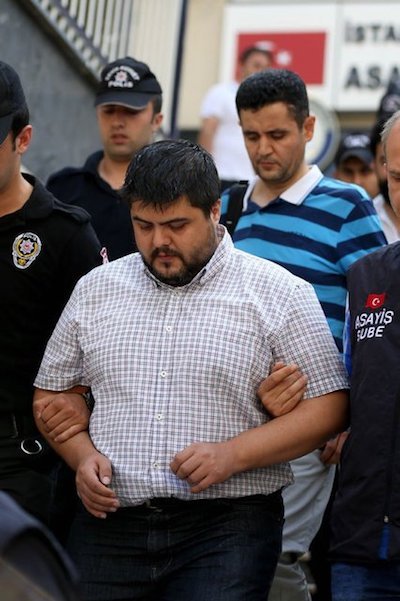
Among the critical tweets he wrote, one stands out from the rest in the sense that he highlighted a shadowy links of a pro-Erdoğan businessman when Panama Papers exposed the identities of rich and powerful people around the world who allegedly had offshore holdings in Panama.
In his comment posted on Twitter dated July 7, 2016, Şanlı gave a link to a news-story on leftist Cumhuriyet Daily and made a note of “A businessman very close to Erdoğan, Mustafa Latif Topbaş who is the owner of BİM [a supermarket chain] and main shareholder of Albaraka-Turk [a joint venture Turkish-Arabic Bank] has off-shore accounts in Panama and Switzerland.” The prosecutor Çağlak considered that comment to be an evidence of terrorism and charged him with terrorism in the indictment.
Another purported evidence brought against Şanlı consists of messages he shared from other journalists. He retweeted Fox TV anchorman İsmail Küçükkaya’s messages that questioned the narrative on coup attempt that raised question marks in the minds of many. Although Şanlı was held accountable for retweeting these messages, İsmail Küçükkkaya who wrote them in the first place was never questioned.

Şanlı was also accused of being critical against a court decision that unlawfully ruled for the government’s seizure of İpek Medya Group, the third largest media group that he had worked. His critical writings about the seizure order were considered to be crimes.
The journalist was formally arrested on July 29, 2016 over charges of being a member of a terror organization called FETÖ, a hoax terror group that was fabricated by the Erdoğan regime to defame civic Gülen movement. He was among 42 journalists against whom the government issued a sweeping detention orders right after the controversial coup attempt on July 15, 2017.

“As a victim of a plot, I have been jailed for nine months for no reason. [Authorities] try to find an evidence while I was in detention. They want to give critical journalists a lesson,” said Şanlı.
Şanlı denied he ever used ByLock, a publicly available messaging app that the Turkish government alleges used by the members of the Gülen movement although indeopendent research studies refute this claim. “In parallel to evaluating how ByLock can be considered to be an evidence, prosecutors should investigate over 13 million WhatsApp users since putschists used WhatsApp during the coup attempt,” the journalist remarked.
When asked if he would like to benefit from the repentance law by coming forward with revelations, the journalist replied: “My only remorse is that I could not set aside time for my wife and mother due to hard work in the journalism career.” He reiterated that the government persecuted journalists for the fact that journalists bothered the government for their critical writings. He concluded his defence statement by saying that “Journalism is not a crime.”
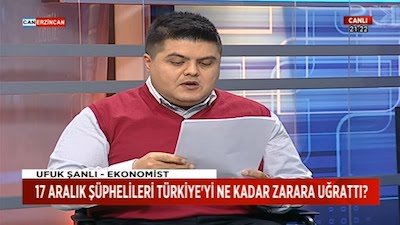
Şanlı started his journalism career as an intern in a national network TGRT TV when he was a student at the Department of Journalism at the University of Ege in İzmir. After graduation, he landed a job at Aksiyon newsweekly, then best-selling magazine of Turkey. In 2002, he moved to work Zaman, one-time best-selling daily in Turkey before the government’s seizure on March 2016.
He authored a book on relations between Turkey and the International Monetary Fund (IMF) which was a hot topic in Turkey due to home-grown economic crisis that prompted Turkey to seek IMF stand-by funds to sustain the economy. He returned to Aksiyon newsweekly in 2005. Later he started working for Sabah newspaper in 2008. After working two years there, he started producing business programs for state-owned network TRT Arabic TV. Then he worked at Vatan daily as a business columnist, mostly writing on energy and economic matters.
In 2014, he was tapped to lead the business section of newly launched Millet daily. He often appeared on Bugün TV which was a sister company at İpek Media Group until the government unlawfully seized them on October 28, 2015. The government-appointed trustees immediately fired him. He was jobless when he was arrested on July 29, 2016.

Şanlı is known for his dynamism, optimism and a good sense of humour by his colleagues. His final joke was “I would be home for dinner,” while the police officers were taking him to the Police Station in İstanbul. His wife still awaits him to join for a supper.
Turkey is the biggest jailer of journalists in the world. The most recent figures documented by the Stockholm Centre for Freedom (SCF) has showed that 255 journalists and media workers are in jails as of October 28, 2017, most in pre-trial detention languishing in notorious Turkish prisons without even a conviction. Of those in Turkish prisons, 231 are arrested pending trial, only 24 journalists remain convicted and serving time in Turkish prisons. An outstanding detention warrants remain for 133 journalists who live in exile or remain at large in Turkey.
Detaining tens of thousands of people over alleged links to the Gülen movement, the government also closed down more than 180 media outlets after the controversial coup attempt.
Turkey survived a controversial military coup attempt on July 15, 2016 that killed 249 people. Immediately after the putsch, the Justice and Development Party (AKP) government along with President Erdoğan pinned the blame on the Gülen movement.
Gülen, who inspired the movement, strongly denied having any role in the failed coup and called for an international investigation into it, but President Erdoğan — calling the coup attempt “a gift from God” — and the government initiated a widespread purge aimed at cleansing sympathizers of the movement from within state institutions, dehumanizing its popular figures and putting them in custody.
Turkey has suspended or dismissed more than 150,000 judges, teachers, police and civil servants since July 15. Turkey’s Justice Ministry announced on July 13 that 50,510 people have been arrested and 169,013 have been the subject of legal proceedings on coup charges since the failed coup.


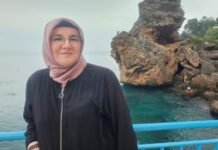

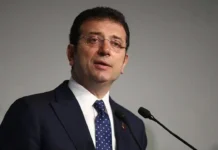



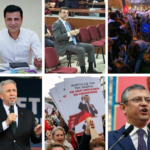







[…] Ufuk ŞanlıUfuk Şanlı […]